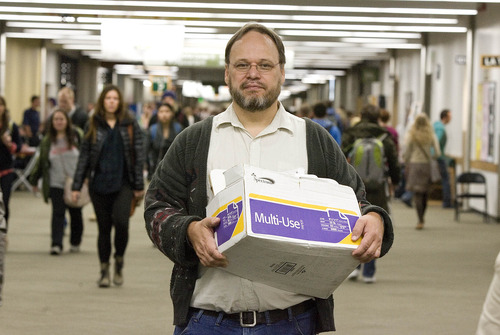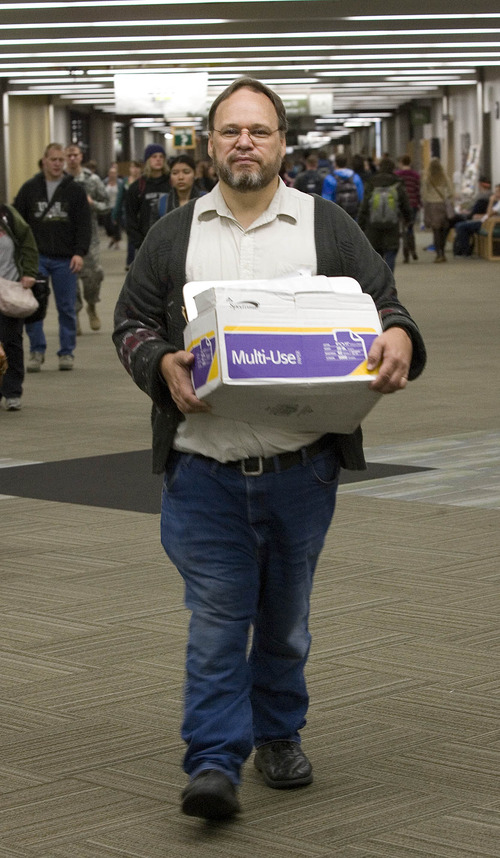This is an archived article that was published on sltrib.com in 2012, and information in the article may be outdated. It is provided only for personal research purposes and may not be reprinted.
Orem • On a recent Friday in Alma Wilson's Math 1030, a course in quantitative reasoning, he asked for a show of thumbs as he explained scaling factors.
"Think of a cube. If you double the length of the edges, what happens to the volume?" Wilson asked. A student answered correctly that it expands eight-fold.
"You double the diameter of a ball, it goes up eight times. Is this making sense?" asked Wilson, a Utah Valley University adjunct professor of math.
Some thumbs went up, some down. For the lost students, Wilson demonstrated shortcuts for determining scaling factors.
Wilson wishes the financial math associated with his UVU employment made as much sense to him. For many adjuncts struggling to stitch a living together from teaching, the scaling factor is not working out at all.
As enrollments boomed in recent years, UVU administrators hired dozens of full-time professors on the tenure track and lecturers. But they also assigned more course sections to adjuncts, paid a flat sum for each class. Now many teach full-time loads, sometimes spread between two or more schools, holding positions that were intended to be a part-time complement to other employment.
The situation has led to what UVU adjunct professor Ed Firmage calls a two-tiered faculty, one with tenure and salary, the other a "permanent academic underclass of wage slaves."
By last year, about two-thirds of UVU's 1,600-member academic workforce were adjuncts, who teach slightly less than half of all course sections.
—
'Walmart' of academia • Wilson teaches at UVU without office space, medical benefits or a hint of job security. He expected to make $22,220 — about half to a third of an average UVU full-time faculty salary — for the 30 credit hours he teaches a year.
However, he was recently told the school doesn't intend to renew his contract.
"What do you do when you have more and more of your workforce who is underpaid and doesn't know if they have a job from one year to the next?" he asks. "It doesn't send the right message about meritocracy. It says more and more things are driven by privilege."
Wilson, who holds a doctorate in theoretical physics from Brigham Young University and has six children, feels adjuncts "are working in the Walmart of the academic world. To change that, we need to determine what teaching is worth."
Among UVU faculty, there is general agreement that the lack of equity is neither fair nor sustainable, but there are opinions vary about how to address it. Some call for forming a union; others are building alliances with tenured colleagues to change the system from within.
An increasingly vocal group of UVU adjuncts is seeking treatment on par with statewide standards, such as office space, faculty senate representation, equitable pay and some measure of job security.
On Oct. 30, UVU's Faculty Senate voted to form a committee to examine concerns raised by adjuncts and their allies. It will feature a tenured and an adjunct professor from each of UVU's eight colleges.
—
A question of fairness • UVU's reliance on adjuncts is emblematic of the trend across academia. The national ranks of tenure-track faculty are shrinking while schools pile on adjuncts, who are cheaper to hire and easier to fire, according to the American Association of University Professors.
Tenured and tenure-track professors made up 47.1 percent of the academic workforce in 1975, while adjuncts made up 34.3. By 2009, the two categories swapped positions, with adjuncts making up 46.2 percent to tenure-track professors' 34.3.
Advocates say it is time for academic leaders to recognize the professionalism of adjuncts.
"This is not just a question of workplace fairness, which is important, but also a question of what's fair to the student. They deserve to have instructors who are receiving all the professional support they need to do their jobs," said Maria Maisto, an English professor at Cuyahoga Community College in Cleveland. "The faculty as a whole are being threatened. It's only a matter of time before everyone is on a contingent contract."
Her group, the New Academic Majority, surveyed adjuncts this year and found many had little access to office space, phones and computers, and received short notice for class assignments.
"These professors have little time to prepare. That doesn't make good for a good classroom experience. Many do prepare, but on their own time, unpaid," Maisto said.
—
'Not meant to support a family' • Administrators say they are sympathetic, but are constrained by the school's funding model, which taps students to foot most of the bill and forces them to keep instruction costs down. In the last three years, however, UVU has hiked adjuncts' per-section pay from $1,750 to $2,220.
"That's roughly 26 percent, but 26 percent of a little is not a lot," said Provost Ian Wilson, no relation to Alma. That adjunct wage is not the lowest in the state, but far below the $3,000 the University of Utah pays per section.
UVU has tried to restrict adjuncts to no more than 11 credits per semester to keep them from reaching a full-time load, which would trigger a requirement to provide benefits. But many are exceeding that threshold. Adjuncts are generally drawn to the job out of a love of teaching and most have work experience that can be of value to students, according to the provost.
"They know they are not making a lot, but they aren't doing it for the money. We are lucky. In this valley we have a lot of people who can do this," Wilson said.
He agrees the pay is low, but adds: "You don't want to be rude, but it's supposed to be a part-time job. It's not meant to support a family."
But Alma Wilson see the arrangement as exploitative. While his confrontational tone has alienated some, Wilson is hardly alone in seeking change.
Jason Brown teaches philosophy at UVU and religion at Salt Lake Community College. That's five sections in the fall, another five in the spring, and he then works summers as a seasonal forester in the Wasatch-Cache National Forest.
"What's happening comes with the glut of degree-possessing people like me. There is an excess of workers and the university is using that to drive down costs. I see universities taking advantage of an unworkable situation," said Brown, who holds master's degrees in theology and religion from Yale. "This is my livelihood. I'm fine if I don't qualify for the tenured job, but we need to meet in the middle."





